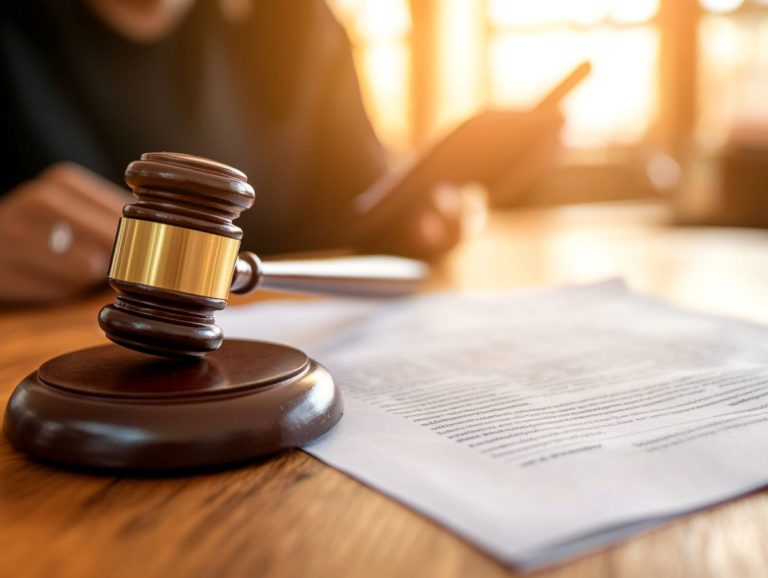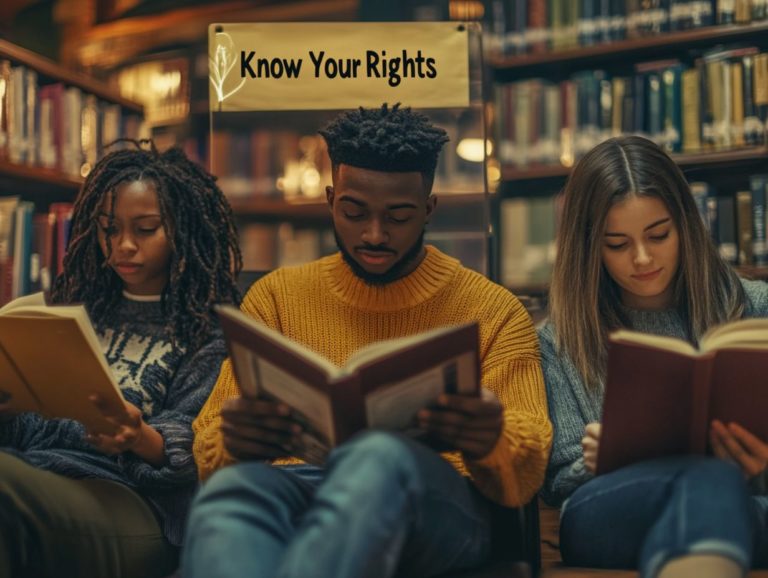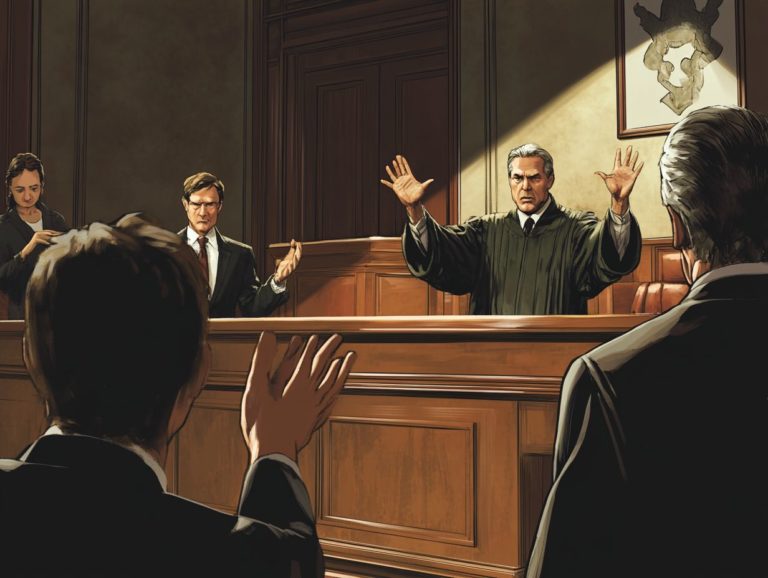The Right to a Public Trial: What It Means
The right to a public trial is a cornerstone of your justice system, ensuring transparency and accountability in legal proceedings.
This article delves into the critical importance of public trials, the constitutional protections that uphold this right, and what exactly a public trial involves.
It examines the exceptions where trials may be closed, the important role of the media and public opinion in maintaining fairness, and how this right serves to benefit the accused.
It also addresses the challenges and controversies surrounding public trials, offering you a comprehensive view of this vital aspect of justice.
Contents
- Key Takeaways:
- The Importance of a Public Trial
- The Legal Basis for a Public Trial
- What a Public Trial Entails
- Exceptions to the Right to a Public Trial
- Ensuring a Fair and Impartial Trial
- Protecting the Rights of the Accused
- Challenges to the Right to a Public Trial
- Frequently Asked Questions
- What does the right to a public trial mean?
- Why is the right to a public trial important?
- What are the benefits of a public trial?
- Are there any exceptions to the right to a public trial?
- What happens if a person’s right to a public trial is violated?
- Is the right to a public trial guaranteed in all countries?
Key Takeaways:
- The right to a public trial is fundamental for fairness and transparency.
- Constitutional protections ensure accountability and due process.
- Exceptions to the right must be carefully evaluated to guarantee a fair trial.
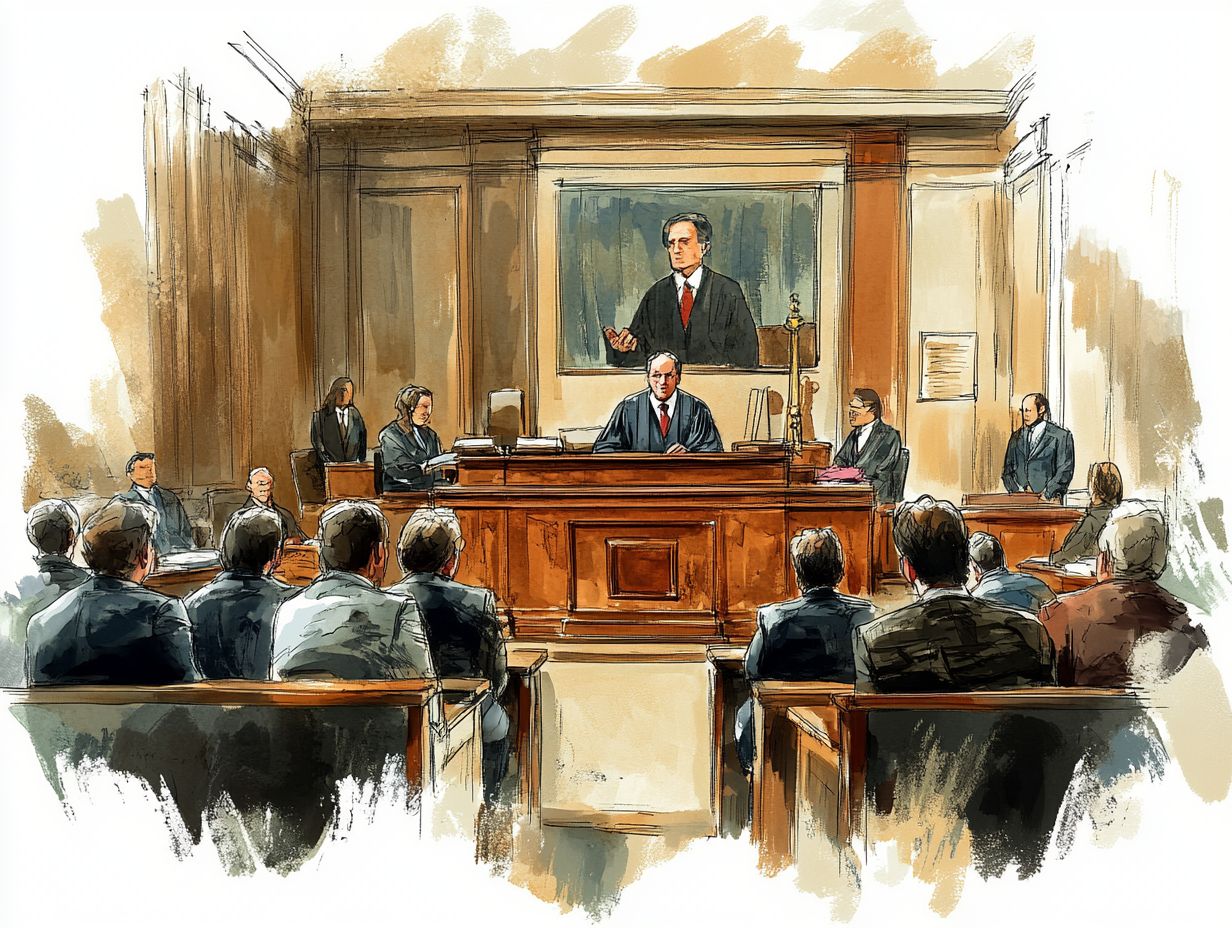
The Importance of a Public Trial
The notion of a public trial is fundamentally rooted in the principles of justice. Your right to a public trial stands as a cornerstone of the fair trial rights articulated in the Sixth Amendment of the US Constitution.
Public trials cultivate transparency, ensuring that courtroom proceedings remain open to scrutiny by both the community and the media. This openness plays a vital role in checking judicial power, which refers to the authority judges have to make decisions and rulings in legal cases.
Additionally, public access upholds the rights of the accused and fosters confidence in the integrity of the criminal justice system.
Why the Right to a Public Trial Matters
The right to a public trial is vital because it guarantees that legal proceedings are conducted with fairness and integrity, protecting the accused’s rights while encouraging community involvement.
This transparency allows you to witness the judicial process firsthand, fostering a sense of trust in the legal system.
When trials happen in front of everyone, they hold the judiciary accountable and enable you to engage actively with ongoing criminal cases. Such involvement can shape public opinion, affecting societal perceptions of justice and influencing the actions of legal authorities.
Importantly, this public scrutiny acts as a safeguard against potential abuses of power, ensuring that trials serve not merely as legal formalities but as pillars of democratic values.
The Legal Basis for a Public Trial
The foundation for a public trial is deeply anchored in the Sixth Amendment of the US Constitution, which ensures your right to a fair trial.
This principle is further reinforced by the First Amendment, which upholds the freedoms of the press and public access, creating a robust framework that safeguards transparency and justice in the legal process.
Constitutional Protections
Constitutional protections for public trials are firmly established in both the Sixth and First Amendments, ensuring that courtroom proceedings remain accessible to you and safeguarding the rights of the accused during criminal prosecutions.
The Sixth Amendment mandates that trials be open to public scrutiny, promoting transparency in the judicial process and fostering your trust in the legal system.
This commitment to openness is further enhanced by the First Amendment, which protects the freedom of the press, allowing reporters to cover these proceedings and keeping you informed about the workings of the justice system.
Together, these amendments create a robust framework that not only secures your right to a fair trial but also guarantees that you can observe and engage with the judicial process, reinforcing the essential principles of democracy and accountability.
What a Public Trial Entails
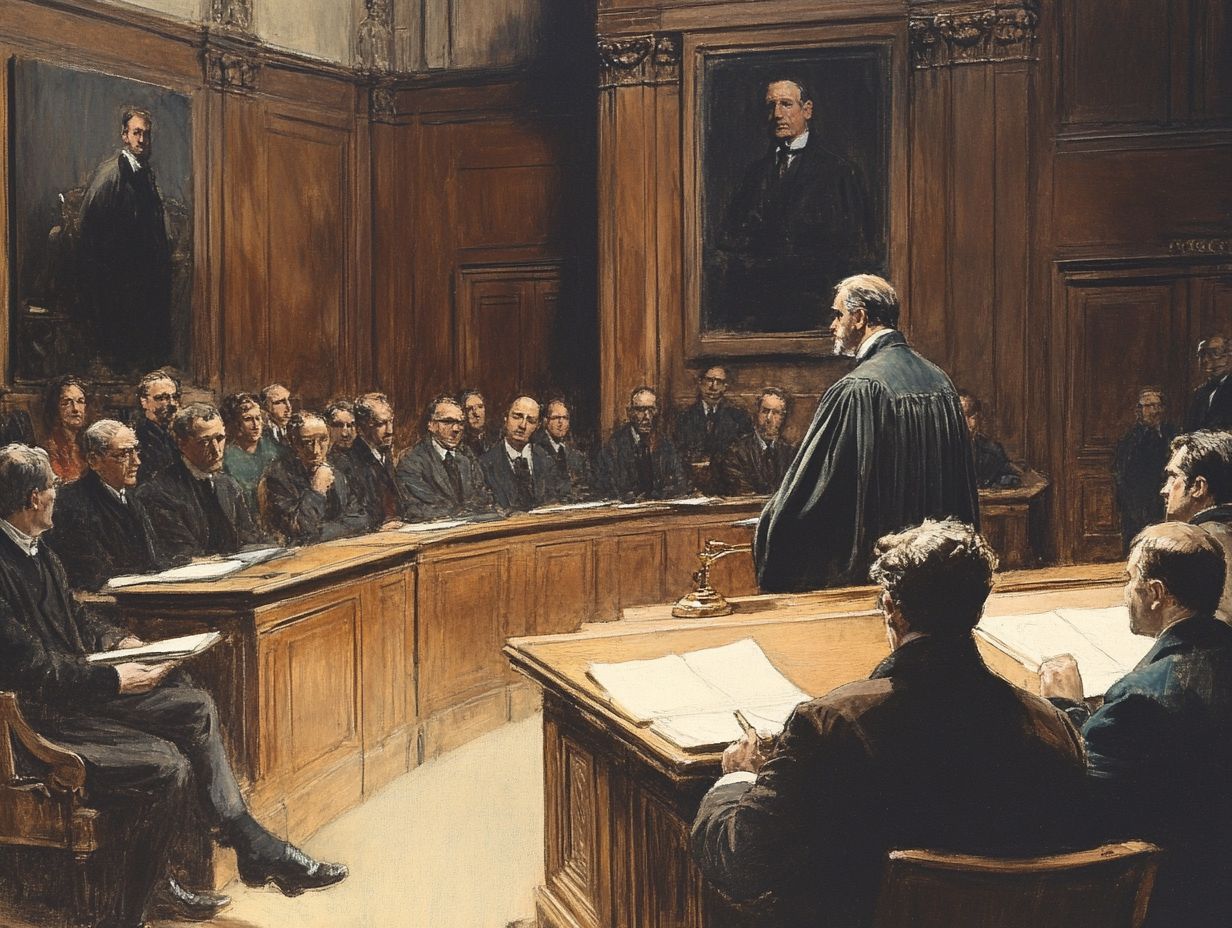
A public trial encompasses several vital elements, including open courtroom proceedings, specific procedural requirements that govern jury trials, and the essential role of media access, which significantly contributes to keeping the public informed.
Key Elements and Requirements
The key elements and requirements of a public trial revolve around rules that guide the trial process. These rules ensure that the courtroom remains open and transparent, strictly adhering to legal standards.
They include aspects such as the presence of judges, jurors, attorneys, and court reporters. Each plays a vital role in upholding the integrity of the judicial system.
Judges maintain order and ensure that all legal protocols are followed. Jurors provide impartiality, reflecting the community’s values.
Procedural requirements, such as the right to a fair hearing and public access to proceedings, further bolster transparency and accountability.
Together, these elements create an environment where justice is administered and visible to the community, fostering trust in the judicial process.
Exceptions to the Right to a Public Trial
While the right to a public trial is fundamental, there are exceptions that permit courtroom closures under certain conditions.
These may include the privacy interests of witnesses or the need to ensure public safety during sensitive suppression hearings.
When a Trial May Be Closed to the Public
A trial might be closed to the public under specific circumstances, particularly when public safety is at stake or when the privacy concerns of individuals involved outweigh the right to access.
Such closures often occur in cases involving sensitive topics, like sexual assault. Revealing certain details could harm the victims or compromise the jury’s impartiality.
Legal precedents dictate that courts must balance the First Amendment, which protects the freedom of speech and press, ensuring public access to judicial proceedings, with the Sixth Amendment rights that guarantee a fair trial.
Key institutions, including the Supreme Court and various state court systems, emphasize the importance of transparency while recognizing that certain exceptions are vital to protect vulnerable individuals and uphold the integrity of the judicial process.
Ensuring a Fair and Impartial Trial
Ensuring a fair and impartial trial is essential to the integrity of the judicial system. In this context, public scrutiny, community concern, and media access serve as vital safeguards for the rights of the accused.
Your understanding of these elements is key to appreciating the balance that maintains justice.
The Role of the Media and Public Opinion
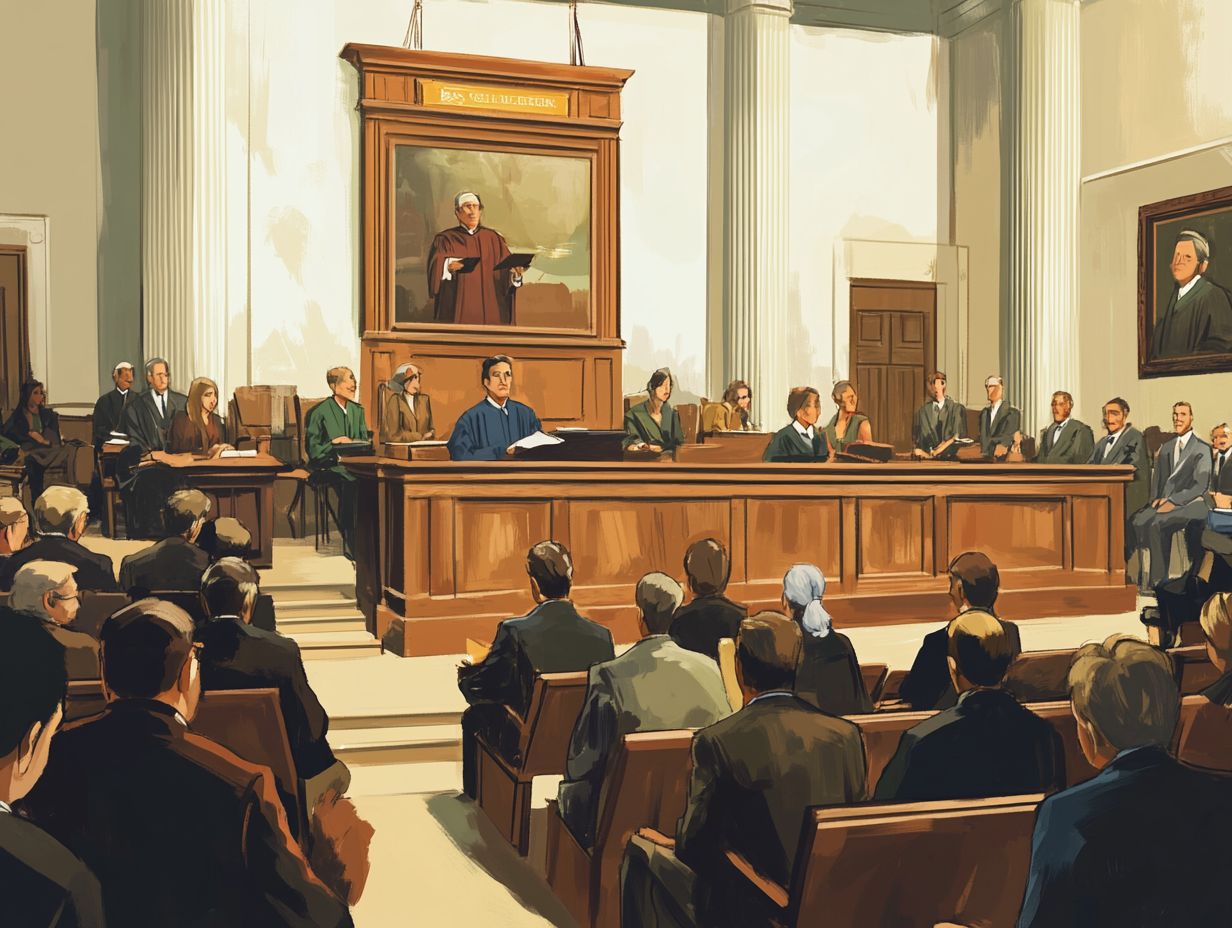
The media plays a crucial role in shaping public opinion about courtroom proceedings. Through press coverage, you gain transparency and insights into the implications of criminal justice outcomes.
When various media forms television, print, or online platforms report on trials, they do more than present facts; they provide context that enhances your understanding.
For example, televised trials bring raw courtroom emotions into your living room, while investigative journalism explores systemic issues in a case. This layered coverage affects how you perceive justice, fairness, and accountability.
Consequently, the media’s responsibility goes beyond reporting. It is critical for fostering an informed citizenry and enriching discussions about legal rights and societal norms.
Protecting the Rights of the Accused
Public trials serve a crucial function in safeguarding the rights of the accused. They ensure that the entitlement to a fair trial is maintained even in the face of criminal prosecution and due process considerations.
These proceedings not only uphold justice but also foster transparency, allowing the community to witness the judicial process in action.
As you reflect on public trials, consider how they affect your understanding of justice and the judicial system.
How a Public Trial Can Benefit the Accused
A public trial can significantly benefit you. It ensures transparency throughout the legal proceedings.
This openness protects you from potential biases or misconduct by legal entities. It also allows the public to observe the judicial process.
By promoting impartiality, public trials enhance the credibility of the justice system. This ultimately leads to a more equitable resolution.
Collective scrutiny provides you with assurance that your defense is adequately represented. This nurtures a balanced and fair legal environment.
Challenges to the Right to a Public Trial
Challenges to the right to a public trial often arise in the courtroom. Legal disputes over courtroom closures or restrictions can ignite community concerns about the fundamental importance of open trials.
Controversies and Legal Battles
Controversies surrounding public trials frequently stem from legal battles. These challenges question the delicate balance between courtroom closure and the rights of the accused.
In recent years, these cases have ignited passionate debates. They reflect broader societal values regarding transparency and justice.
Public access is hailed as a cornerstone of a fair trial. However, it can clash with individual privacy rights, leading to intense scrutiny from both the courts and the public.
High-profile trials, especially those involving celebrities or contentious cases, become flashpoints for discussion. How much should be revealed in the name of justice?
This ongoing struggle highlights the complexities of the legal system. It also showcases evolving cultural attitudes toward privacy and accountability in an era inundated with information.
Frequently Asked Questions
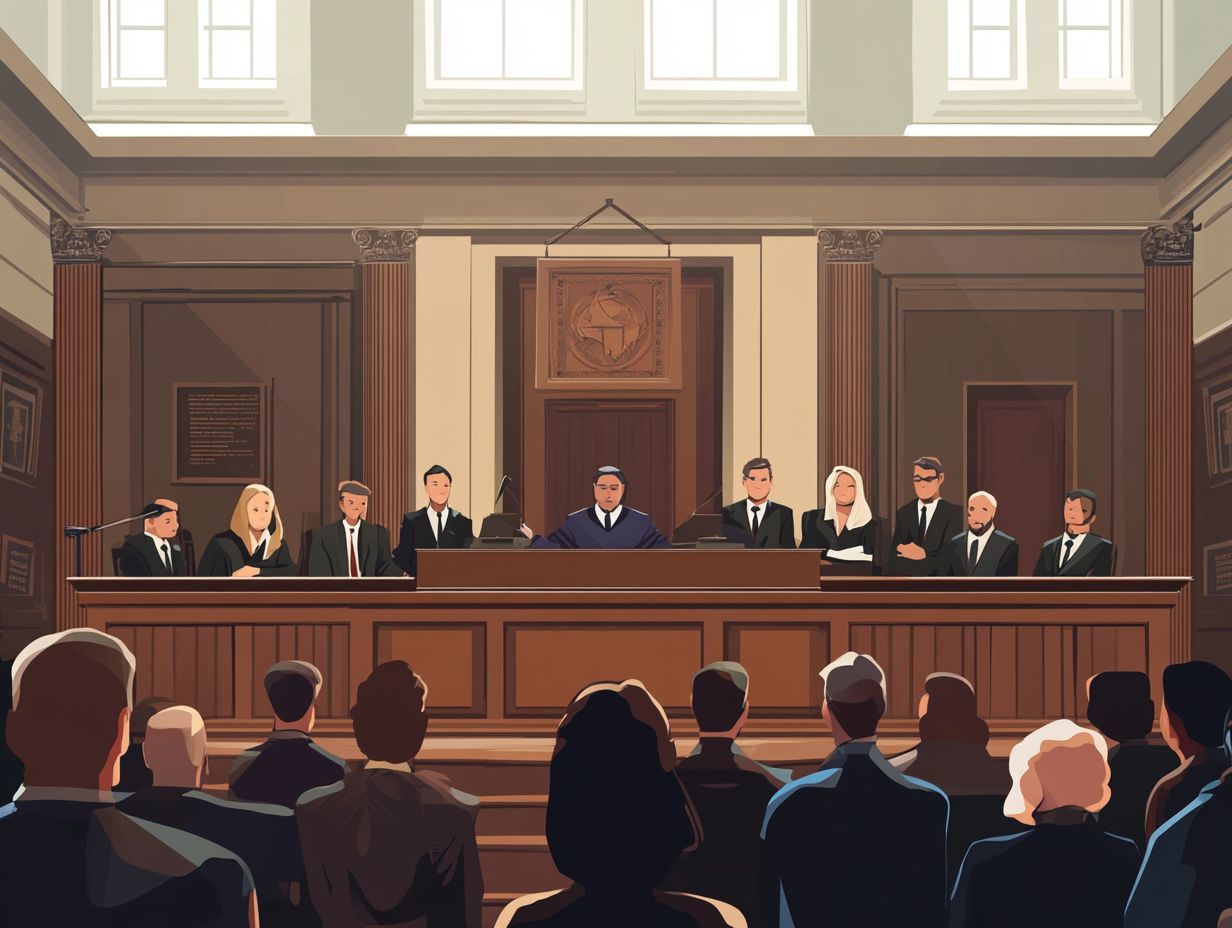
What does the right to a public trial mean?
The right to a public trial means that any individual accused of a crime can have their case heard in a court of law open to the public. This ensures transparency and fairness in the judicial system.
Why is the right to a public trial important?
The right to a public trial is crucial because it allows for a fair and impartial trial. It serves as a check against potential abuses of power by the government, ensuring accountability in the judicial system.
What are the benefits of a public trial?
A public trial allows for transparency and accountability in the judicial system. It gives the accused the opportunity to defend themselves in front of a jury of their peers, ensuring a fair trial.
Are there any exceptions to the right to a public trial?
Yes, exceptions exist. In cases involving national security or sensitive information, a judge may order certain portions of the trial to be closed to the public.
What happens if a person’s right to a public trial is violated?
If a person’s right to a public trial is violated, it can result in a mistrial or the conviction being overturned. The accused may also have the right to seek compensation for damages caused by the violation.
Is the right to a public trial guaranteed in all countries?
The right to a public trial is recognized as a fundamental human right in most democratic countries. However, the extent and limitations of this right may vary from country to country.

